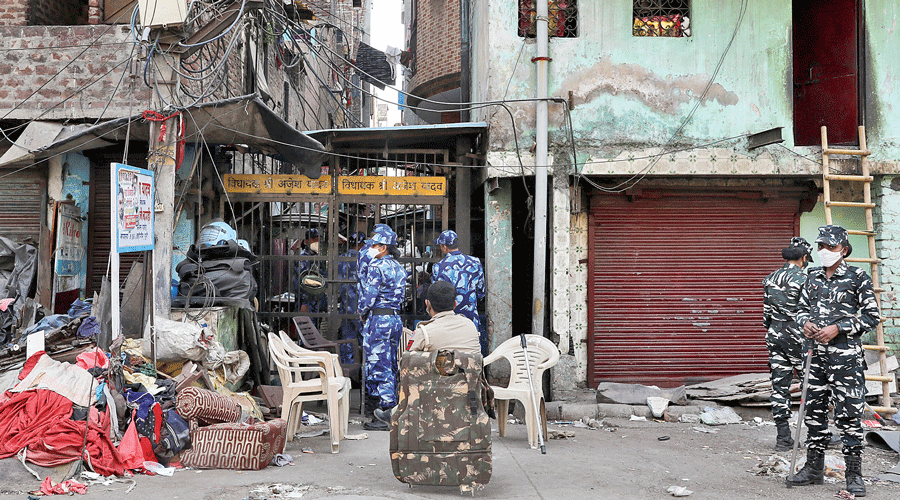The leading voice for Rohingya refugees in India on Thursday appealed to people not to believe rumours and false allegations of Rohingya involvement in riots in the country, such as the Jahangirpuri violence on Saturday.
Several political activists and public intellectuals too tweeted against the BJP narrative — now adopted also by Delhi’s ruling Aam Aadmi Party — of blaming “Bangladeshis and Rohingyas” for Saturday’s communal clash.
Both these groups of immigrants are mainly Muslim. However, no foreigner has so far been accused by the police over the violence.
Block C, where the violence took place, has a large Bengali-speaking population from multiple religions although no Rohingyas are believed to live there.
Sabber Kyaw Min, who heads the Rohingya Human Rights Initiative and Free Rohingya Coalition here, said Rohingyas condemned any communal strife since such strife in Myanmar had turned them into refugees.
“I guarantee you that no one from our community is involved. We have no role in Indian politics. We merely seek India’s protection as we have survived genocide. We only appeal for our right to life, enshrined under the Universal Declaration of Human Rights and the Indian Constitution,” he told The Telegraph.
“We survive on the benevolence of the government from whom we seek shelter and education. We respect India as a fountain of progress in the region, before and after we came here, and will continue to do so once we are able to return home. A section of TV channels and leaders seek to end our existence. We can only appeal to people to verify with authorities any rumours you hear about us.”
The United Nations Human Rights Commission has 26,095 refugees from Myanmar registered in India. They are mainly the Muslim-majority Rohingyas and the Christian Chins.
In a reply in the Rajya Sabha in 2017, the Centre had said it estimated the total number of Rohingya refugees in the country to be around 40,000. Many have since fled crackdowns by police and vigilante groups, and moved to Bangladesh which has witnessed higher economic growth than India and has designated camps for refugees, just as India has for Sri Lankan Tamils and Tibetans.
“From Jammu (where police have recently evicted several Rohingyas) 300 have gone to Bangladesh in the last two weeks,” Kyaw Min said.
Around 1,200 Rohingyas live in Delhi, mainly in Kanchan Kunj and Madanpur Khadar on the west bank of the Yamuna in southeast Delhi. Last year, many were evicted from a part of the floodplains that is owned by the Uttar Pradesh irrigation department. The first Rohingya refugee girl to enrol in college, Tasmida Johar, is from this slum.
On Thursday, Delhi BJP president Adesh Gupta wrote to the BJP mayors of South and East Delhi to “run bulldozers and take strictest action against unauthorised encroachments by antisocial elements”, which he alleged were protected by “MLAs and local leaders of the Aam Aadmi Party”.
Gupta had earlier in the day said these alleged encroachers were “Bangladeshis and Rohingyas”.
Delhi leader of the Opposition Ramvir Bidhuri of the BJP said: “The Delhi government has resettled those evicted by Uttar Pradesh in Madanpur Khadar…. If they are not evicted, then we will launch an agitation.”
On Wednesday, several AAP leaders had made identical public statements accusing the BJP of settling Bangladeshis and Rohingyas in India to cause riots. The AAP’s return to xenophobia — one of its ministers had fanned hatred against Africans in 2014 — led to a wave of condemnation.
Artist Shuddhabrata Sengupta wrote on Facebook: “It’s not enough to tell the Aam Aadmi Party’s leadership that not all Bengali Speaking Muslims in Delhi are Bangladeshi. We have to say that even if some of those Bengali Speaking Muslims are indeed Bangladeshi, they have every right to be in our city, just like everybody else does.
“And that goes for the Rohingya too. I say this as a Bengali speaking citizen of Delhi. And no, I do not respect the idea that people are not welcome in Delhi just because they are not Indian citizens.”
Trinamul MP Sajda Ahmed tweeted: “It is very unfortunate and painful that Bengali speaking Indian Muslims living in national capital Delhi are being painted as Rohingya and Bangladeshi. #JahagirpuriViolence. BJP should stop this heinous game.”
Ahmed is to be part of a Trinamul fact-finding team to the area on Friday. A Congress delegation visited the spot on Thursday, and a Samajwadi Party team is to do so on Friday.
On Wednesday, CPM and CPIML Liberation representatives had stalled the demolition that had continued for nearly two hours after the apex court ordered a status quo. Both parties are now conducting surveys to estimate the economic losses suffered by those whose premises were demolished.
CPIML Liberation politburo member Kavita Krishnan tweeted: “Too cowardly to say BJP is turning Hindus into terrorists, @AtishiAAP, so you claim ‘Bangladeshis’ (there aren’t any, in Jahangirpuri they’re BanglaBHASHI Muslims from Midnapore) & ‘Rohingyas’ (most helpless stateless refugees in the subcontinent) are responsible for riots?”
SFI joint secretary Dipsita Dhar too addressed AAP MLA Atishi Marlena, an Oxford scholar and education expert who was among those blaming Bangladeshis and Rohingyas for the riots.
Dhar tweeted: “Not every Bangla speaking Muslim is Bangladeshi. Delhi’s economy is heavily contributed by these underpaid, low waged Bengali Muslims from West Bengal. They collect your scrap, work in your homes, and take your classist communal brunt time to time.”
At the Delhi-government-funded Ambedkar University, campus officials on Thursday broke up a demonstration by CPM student arm SFI against the Jahangirpuri demolition drive.











